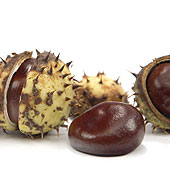Horse Chestnut - Natural Health Product
Non-traditional solutions to help boost your health and wellness.
Horse Chestnut
General Information
Horse chestnut trees are native to the Balkan Peninsula (for example, Greece and Bulgaria), but grow throughout the northern hemisphere. Its primary active ingredient is called aescin or escin. Although horse chestnut is sometimes called buckeye, it should not be confused with the Ohio or California buckeye trees, which are related but not the same species.
Common Name(s)
Scientific Name(s)

How is this product usually used?
The daily dose of all standardized extracts is 50 mg to 150 mg of aescin, the primary active ingredient; the daily dose of non-standardized extracts, powder, decoction, and infusion is 0.3 g to 5 g of dried seeds. The specific dose is dependent on each formulation.
Topical (surface-applied) preparations of horse chestnut are also used.
What is this product used for?
For centuries, horse chestnut seeds, leaves, bark, and flowers have been used for a variety of conditions and diseases.
Horse chestnut seed extract has been used to treat chronic venous insufficiency (a condition in which the veins do not efficiently return blood from the legs to the heart). This condition is associated with varicose veins, pain, ankle swelling, feelings of heaviness, itching, and nighttime leg cramping.
The seed extract has also been used for hemorrhoids.
Your health care provider may have recommended this product for other conditions. Contact a health care provider if you have questions.
What else should I be aware of?
Small studies have found that horse chestnut seed extract is helpful in treating chronic venous insufficiency and is as effective as wearing compression stockings.
There is not enough scientific evidence to support the use of horse chestnut seed, leaf, or bark for any other conditions.
Do not use raw or unprocessed horse chestnut seeds, leaves, bark, or flowers. They contain esculin, which is poisonous. The toxic effect may result in upset stomach or kidney damage. When properly processed, horse chestnut seed extract contains little or no esculin and is considered generally safe when used for short periods of time. However, the extract can cause some side effects, including dizziness, headache, itching, or gastrointestinal upset.
If your symptoms persist or worsen, consult a health care practitioner. If you are pregnant or breast-feeding, consult a health care practitioner before using horse chestnut.
Horse chestnut may increase the anticoagulant or antiplatelet effect of certain medications such as aspirin, warfarin, and clopidogrel. As a result, there may be an increase in risk of bleeding or bruising if they are taken together with horse chestnut.
Because of the blood-thinning effect, you should stop taking horse chestnut 2 weeks before a surgical procedure.
Your health condition may be affected by the use of horse chestnut. Talk to your health care provider before using horse chestnut if you have any of the following diseases or conditions:
- bleeding disorders
- infected or inflamed gastrointestinal tract
- reduced liver function
- reduced kidney function
Horse chestnut should be avoided by people who are allergic to latex.
Before taking any new medications, including natural health products, speak to your physician, pharmacist, or other health care provider. Tell your health care provider about any natural health products you may be taking.
Source(s)
- Health Canada. Drugs and Health Products Monograph: Horse Chestnut. https://webprod.hc-sc.gc.ca/nhpid-bdipsn/atReq.do?atid=horse.chestnut&lang=eng.
- Natural Medicines Comprehensive Database. Horse Chestnut.
All material copyright MediResource Inc. 1996 – 2020. Terms and conditions of use. The contents herein are for informational purposes only. Always seek the advice of your physician or other qualified health provider with any questions you may have regarding a medical condition.


